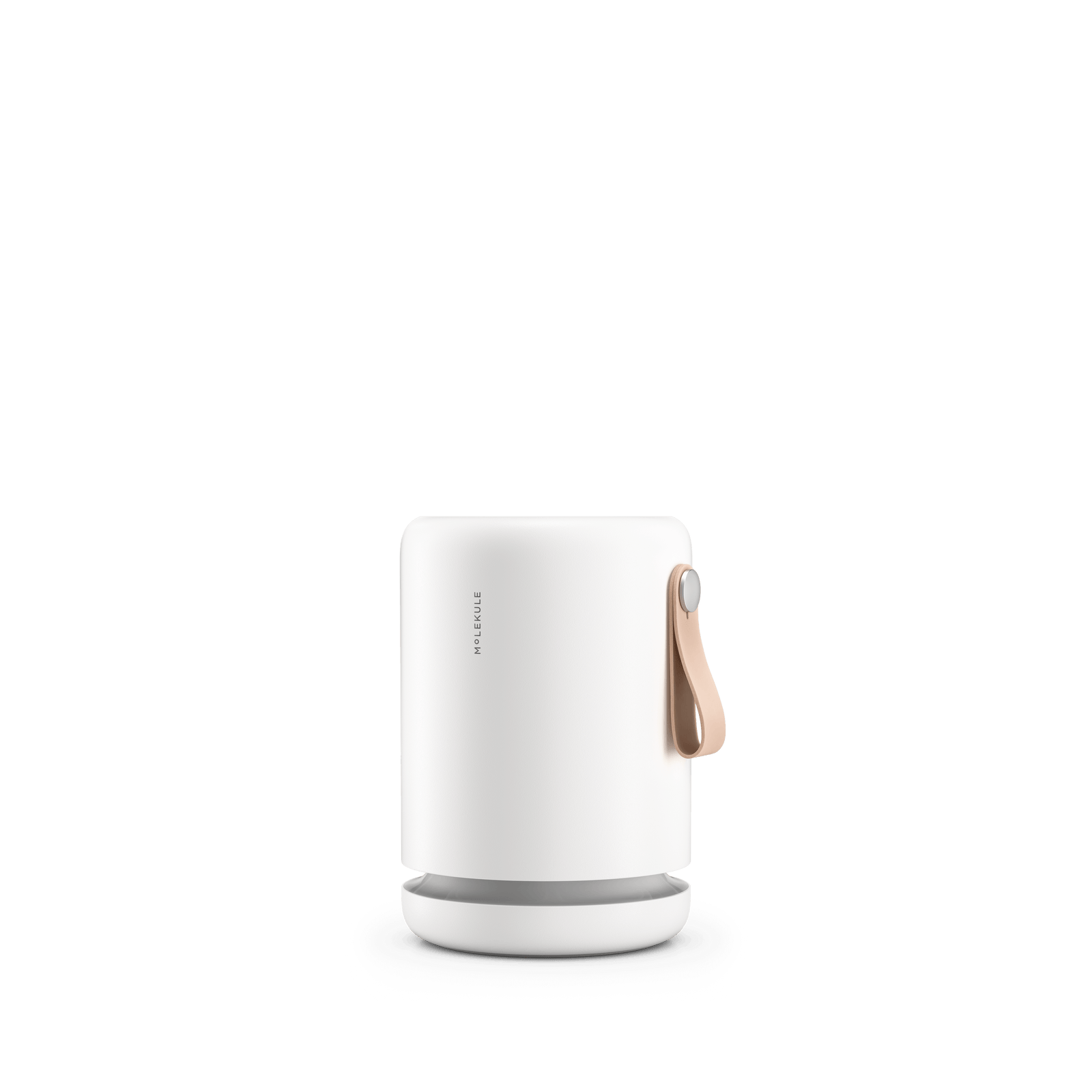Updated by Molekule Staff 3/8/23
People have been smoking marijuana under the radar for decades, but the legalization of weed for both medical use (in 38 states) and recreational use (in Canada, 20 U.S. states, Washington, DC and Guam) means it is much more common and mainstream than it was even as recently as five years ago.
However, smoking pot has some unfortunate drawbacks. Much like tobacco smoke, weed smoke contains several different types of pollutants that can affect your indoor air quality. These toxins and particulates can have a negative effect on both the smoker and anyone who inhales second-hand smoke. Moreover, even if you do not mind the smell of weed smoke, you probably would not want that smell to linger in your house.
Clearing the air in your home of smoke, smell and toxins can be a challenge, especially for heavy users. Fortunately, you can remove such pollutants with an air purifier, and there are a number of technologies that claim to help, with varying degrees of success. But which one will most effectively remove weed smoke from your home? To determine the best air purifier for weed smoke, it is useful to understand both the composition of marijuana smoke and how different air purification technologies work to remove it.
Is weed smoke bad for you?
Yes, lighting anything on fire and inhaling the smoke fits the definition of “bad for you”, but do keep in mind we are talking about the smoke from a burning marijuana joint and its potential pollutants. We will not discuss the health benefits or drawbacks of tetrahydrocannabinol (THC), the substance in marijuana that gives you the “high.” That would be beyond the scope of this article. We also presume you’re an adult who has made the informed decision to smoke weed in your home and would like to minimize the effects of the smoke itself.
Like smoke from any other source, marijuana smoke is associated with greater risk of cancer, according to the California Environmental Protection Agency. Although weed smoke has not been definitively linked to cancer, the bad news is that it is still likely to be harmful to your health and anyone else in your home who inhales the secondhand weed smoke.
A study in the European Respiratory Journal found that lung cancer risk increases eight percent for every year in which a person smokes a joint on a daily basis (even if a year’s worth of smoking is spread out across multiple years). Though weed smoke does not contain nicotine, it does contain similar carcinogens to tobacco smoke. The researchers noted that, “Cannabis smoke is qualitatively similar to tobacco smoke, although it contains up to twice the concentration of the carcinogenic polyaromatic hydrocarbons.”
The National Institute on Drug Abuse states that, “Marijuana smoking is associated with large airway inflammation, increased airway resistance, and lung hyperinflation, and those who smoke marijuana regularly report more symptoms of chronic bronchitis than those who do not smoke.” Furthermore, a study by the California Office of Environmental Health Hazard Assessment found that marijuana smoke contains “at least 33 individual carcinogens present in both marijuana smoke and tobacco smoke,” such as benzopyrene and benzanthracene.
Another key point is that you inhale these toxins directly when you smoke weed. The researchers in the above studies found that marijuana joints are more loosely packed than tobacco cigarettes, resulting in more smoke and tar being inhaled by the user. They also found that marijuana users tend to inhale more deeply and keep the smoke in their lungs longer, thus amplifying the negative effects of toxic substances in the smoke. Finally, they noted that joints are typically unfiltered, and it is unclear if filters made for joints, or using tobacco cigarette filters in joints, actually remove any of the harmful substances from the smoke.
What are the side effects of weed smoke?
The superficial side-effects from smoking weed are the same as cigarettes, including coughing, excess phlegm, wheezing, and abnormal cells in the lungs and throat. Apart from this impact, researchers are saying further conclusions about possible problems are “difficult to make due to a relative paucity of literature.” The medical community seems confident they will find more links showing that marijuana smoke is unhealthy, but right now firm associations with cancer, chronic obstructive pulmonary disease (COPD), or emphysema like with tobacco have been elusive.
There are differences between marijuana and tobacco smokers. Some research indicates that marijuana smokers tend to be able to hold larger volumes of air compared to non-smokers or tobacco smokers, which may result from an impaired ability to transfer gasses deep in the lungs. However, other research casts doubt on these hypotheses, and can only find a link between marijuana smoke and severe lung infections, but not cancer, emphysema, or chronic obstructive pulmonary disease (COPD). Chronic marijuana smokers are more likely to suffer complications during operations to repair a collapsed lung, but that is a rare condition.
What chemicals are found in weed smoke?
The pollutants in weed smoke take two forms: particles and gasses (VOCs, carbon monoxide, and many more). The particulate matter in smoke can be both solid and liquid, and some of the particles are microscopic. Because marijuana tends to have a higher water content than tobacco, liquid particles tend to be in weed smoke. These tiny particles can be inhaled and lodge deep within your lungs, and if they build up over time they may impair lung function according to the American Lung Association.
Since smoke is a product of combustion, the VOCs in weed smoke are similar to those found in other types of smoke. Carbon monoxide, nitrogen oxides, benzene and formaldehyde are among the toxins in marijuana smoke, along with hundreds of other compounds. These gaseous pollutants are different from particulate pollutants.
Which air purifier technology is best for weed smoke?
Only some air purifiers are capable of handling both particulate and gaseous pollutants, and while some might remove pollutants, they can still generate harmful substances themselves. Here are some current air purification technologies, ranked from worst to best, for removing weed smoke from the air.
Ozone generators – These air purifiers intentionally produce harmful ozone, which is a lung irritant. Through a chemical reaction, the ozone reacts with gasses, but with limited effectiveness in removing them from the air. Toxic byproducts are also created during this process, adding to the airborne chemicals already in the air because of the weed smoke. Moreover, ozone generators do not even eliminate the particles that make up a large part of marijuana smoke – the odors may be masked by the ozone smell, but the airborne chemicals remain. The bottom line is that the EPA does not recommend ozone generators for use in enclosed spaces.
Ionizers – Ionizers apply an electric charge to particles that pass through it, causing them to settle out of the air. This process may produce ozone, which would mean the same drawbacks as ozone generators. Ionizers that do not produce ozone are listed on the CARB website. Some ionizers claim that the charged particles will stick to the walls and ceiling, but this means they can be stirred back up and also stick to your lungs better. Effective ionizers will have a high-efficiency filter like HEPA to capture the charged particles. Ionizers are also ineffective against VOCs, so they will not remove gaseous pollutants from weed smoke, that requires an additional filter like activated charcoal..
Carbon filters – These filters use activated charcoal to remove VOCs from the air. The many crevices inside the carbon contain spaces where VOC molecules can become attached, like a lock fitting into a keyhole. This process is known as “adsorption” and can effectively remove VOCs and odors from the air. But the problem with carbon air purifiers is that they eventually become less efficient as the carbon becomes saturated with VOC molecules. Finally, carbon filters do not capture any particulate pollutants whatsoever.
HEPA – HEPA filters are designed to remove 99.97 percent of all particles of 0.3 microns in size, therefore they are acceptable for removing particulate matter from the air, though no filter can remove all of it. However, they do not remove VOCs or odors alone, which composes a large part of weed smoke. If the filter is not changed often enough, it can even become a source of odors.
PECO-HEPA air purifier OR a hybrid (containing carbon + HEPA) – The Molekule PECO air purifier removes both particles and VOCs from the air, which is essential for any air purifier that needs to take on weed smoke. VOCs processed by the PECO-Filter are permanently destroyed, so that they are not released back into the air where they could react and become particles. Alternately, if your personal situation or budget dictates, you might consider a hybrid unit with an adequate amount of carbon AND a HEPA filter because it can address both particles and odors/VOCs in marijuana smoke.
How to get rid of weed smoke and smell
When smoking marijuana, you ideally want to inhale the THC while minimizing your exposure to the other compounds present in smoke. There are a few steps you can take. First, don’t smoke in an enclosed area. It’s best to be somewhere with an open window or vent fan. You should also make sure that the intake of the unit is placed directly near the source of the smoke, and try to reduce the amount of paper in your joints if you roll them yourself. Excess paper is just excess smoke that does not contain any THC. Finally, if you have a specific room where you smoke, wash any bedding, and clean the carpets and upholstery frequently. This will help get rid of weed smells in your home.
If you choose to smoke and are interested in an air purifier for marijuana smells and smoke, taking these preventative steps and using the right kind of weed air filter technology will help ensure that the air in your home remains as clean and healthy as possible.













